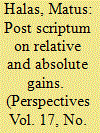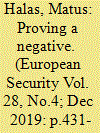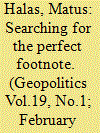| Srl | Item |
| 1 |
ID:
142423


|
|
|
|
|
| Summary/Abstract |
The recent surge of pragmatist scholarship in International Relations emphasizes the need for a shift towards a more practical social science. Abductive reasoning is supposed to serve as one of the tools of such reorientation. This article pays closer attention to this form of inference and shows that it represents our deep trust in the role of error within a scientific enquiry. Although abduction stands for a converse error of affirming the consequent, it also enables us to generate new explanations of many complex problems. Instead of attempting to apply abduction to International Relations as a discipline, we simply show that this inferential practice is already being implemented to a large extent thanks to the agent-based modelling that frequently follows pragmatist tenets. In fact this function of suggesting plausible explanations for further examination in the following stages of scientific enquiry may be easily seen as one of the crucial purposes of this kind of modelling. Three examples illustrate this claim.
|
|
|
|
|
|
|
|
|
|
|
|
|
|
|
|
| 2 |
ID:
162239


|
|
|
|
|
| Summary/Abstract |
In October 2011, the four ruling coalition parties in Slovakia failed to agree upon updating the European Financial Stability Facility. It was ultimately approved with the help of the opposition in exchange for an early election. This self-destructive behaviour by the ruling coalition remains a puzzle with the only available explanations merely referring to the irrationality of the domestic political elite. Our research tackles this problem using game theory. By focusing on the preferences of the key leaders, this article shows that although the fall of government was the only rational outcome, other factors beyond the scope of rational choice theory can suggest a possible explanation.
|
|
|
|
|
|
|
|
|
|
|
|
|
|
|
|
| 3 |
ID:
189271


|
|
|
|
|
| Summary/Abstract |
The question of how to deter sub-conventional activities—characterized by a limited role for the use of force—is one of the biggest puzzles in security studies. A way forward might be to use an enduring rivalry conflict management framework and to focus on findings from criminology. As the case study of 56 Estonian airspace violations suggests, executing sub-conventional deterrence is not an easy task to achieve. NATO’s deterrence success remains elusive, because there is no consistency in responding to these violations and no meaningful punishment. Yet many changes in frequency, intensity, and volatility of Russian intrusions over the last two decades indicate that a successful dissuasion, if not de-escalation, is still possible. To achieve that, NATO needs to improve information transmission, define its deterrence goals more narrowly, impose group-level costs, and implement dynamic deterrence mechanisms offering alternative modes of behavior.
|
|
|
|
|
|
|
|
|
|
|
|
|
|
|
|
| 4 |
ID:
090275


|
|
|
| 5 |
ID:
168964


|
|
|
|
|
| Summary/Abstract |
The increased Russian foreign policy assertiveness and the related security concerns associated with the Eastern Flank of NATO caused a revival of interest in European deterrence after more than two decades of neglect. Yet the absence of a military invasion into the Baltics does not necessarily imply a successful deterrent threat. Quite the contrary: a detailed analysis using Boolean logic suggests that deterrence does not really work in the Baltics, neither at the conventional, nor at the sub-conventional level. A lack of capabilities undermines the credibility of NATO’s conventional deterrence posture despite its clear effort to communicate the threat to the other side. The only reason why the lack of capabilities on the Eastern Flank has no negative consequences for the Alliance is because Russia has (currently) no need to advance its state interests by resorting to military force. At the same time, deterrence fails repeatedly at the sub-conventional level and it will probably continue to fail in the future. Incidents like the relocation of the Bronze Soldier Memorial in 2007, the kidnapping of a security officer in 2014 or the violations of airspace in 2018 can escalate to a full-blown crisis. Limiting the number of such incidents should be the main goal of the cumulative deterrence of hybrid threats.
|
|
|
|
|
|
|
|
|
|
|
|
|
|
|
|
| 6 |
ID:
129587


|
|
|
|
|
| Publication |
2014.
|
| Summary/Abstract |
The story of Lebensraum before World War I resembles a screenplay of an interesting movie. The main villain (Friedrich Ratzel) got the prestige, but did not deserve it, while those that did (Andree and Peschel), were not given it. Villain's éminence grise (Moritz Wagner) plotted against the hero (Charles Darwin) without much effect. Some even tried to turn villain into hero's servant, yet he proved too resilient and remained determined to conquer and culturally transform the world on his own terms. This plot has everything necessary for a good drama.
|
|
|
|
|
|
|
|
|
|
|
|
|
|
|
|